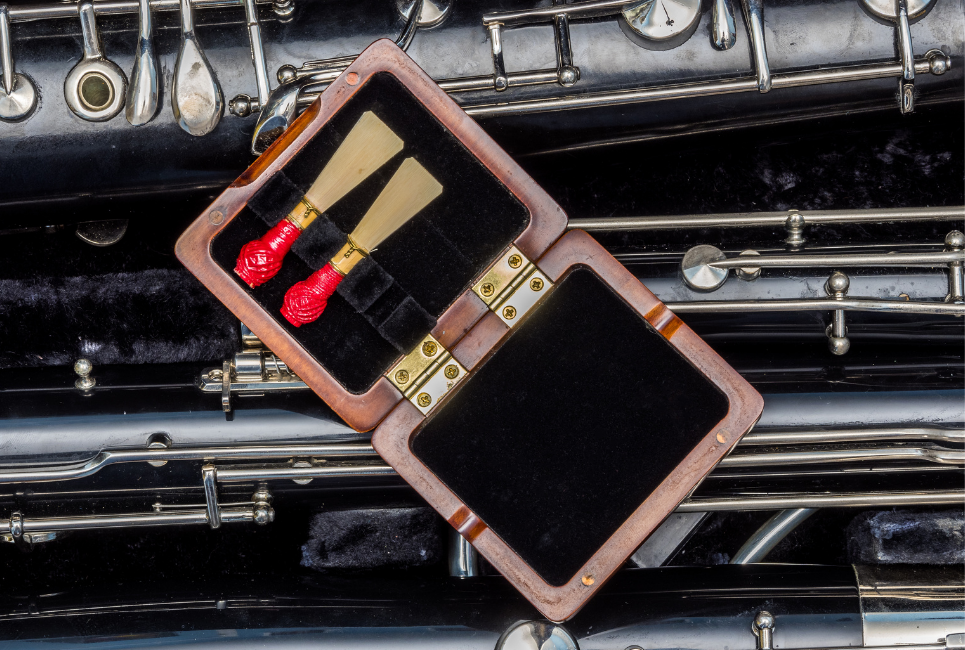- Top Trumpet Embouchure Techniques: Options for Beginners Through Professionals - October 12, 2022
- Is the Trumpet Hard to Learn? - September 30, 2022
- Best Leblanc Clarinet Models Guide: From Soprano to Contrabass - September 5, 2022
The bassoon is probably the hardest woodwind instrument, and having a bad reed doesn’t help. So how can you find the highest quality bassoon reeds? And do they make a huge difference?
Excellent bassoon reeds are responsive and can help you sound good when playing any note on the bassoon. Whether you decide to go shopping for reeds or to make them, you should know about the best options on the market.
What are Bassoon Reeds?
Bassoon reeds are pieces of cane that you or someone else has formed into a playable shape. Like the oboe, the bassoon uses a double reed to produce a sound. That means two reeds vibrate against each other, instead of one reed against a mouthpiece.
Many advanced bassoon players make their own reeds to have more control over the result. However, making reeds can take a lot of time, so beginners usually buy bassoon reeds.
You may also choose to keep buying bassoon reeds if you don’t have the time or space to make them. That way, you can still play the instrument well.
How to Choose Bassoon Reeds
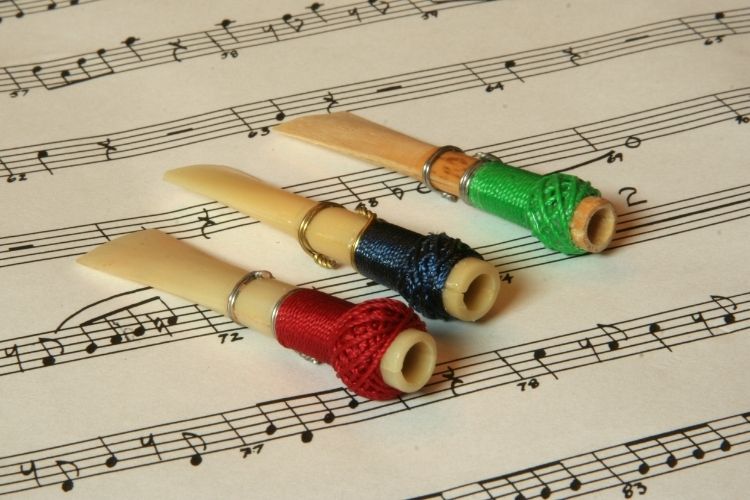
Choosing the highest quality bassoon reeds is crucial, regardless of your playing level. As a beginner, having a good reed can make it much easier to get a sound out of the bassoon. As when you have experience, you can use reeds that offer the tone quality and response you desire. That will give you more control over your sound, so you can project well in an orchestra or chamber group.
Consider a few factors when looking for the best bassoon reeds.
Weight
A reed’s weight can have a huge impact on the sound you can create when playing. If you choose a heavier reed, you will need to blow a bit more, but you can then have a darker tone quality. On the other hand, a lighter reed is more free-blowing, and it can be easier to get a sound out. The sound can be resonant and clear, though it won’t be as dark as with a heavy reed.
Medium reeds combine the best of both worlds, so you can get some darkness in your sound. But you won’t have to blow as hard to get that sound.
Length
The length of the reed and reed tube may not have a huge effect on the sound. However, it’s important to consider when choosing the best bassoon reed for you. A reed’s length may affect the pitch of the instrument, which can make it easier or harder for you to stay in tune. And sometimes, small differences can have huge effects on your playing.
The tube length, though, can affect your sound a bit. If the tube is longer, it can make your pitch lower. That can be a good or bad thing, depending on how you sound on a standard reed.
Tip Width
Similar to the reed length, the width of the reed tip is not the most important factor to consider. But the reed tip-width can affect the pitch, so you may struggle to stay in tune when practicing.
The width can also affect your embouchure and how your lips feel against the reed. If you find a reed tip width that you like, look for reeds with the same width so that you don’t have to change your embouchure all of the time.
Gouge
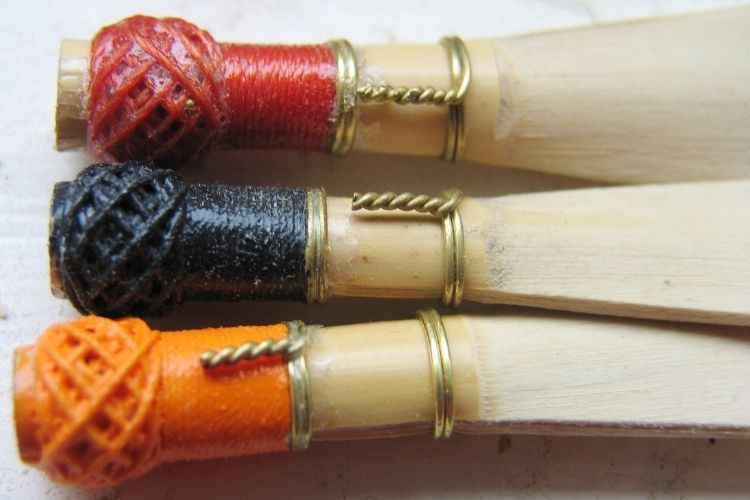
The gouge of a reed can make a big difference when it comes to playing the bassoon. When you use a reed with a thicker gouge, you can get a deep and dark sound, but the reed may not vibrate as easily. If your reed has a thinner gouge, it will sound clearer and resonate better. The thinner gouge will also help the reed be more responsive.
Think about your preferences in sound and if you do well with a less responsive reed. Then, you can look for a reed with the right gouge thickness.
Shape
A reed’s shape is worth considering, particularly when playing at the extremes of the range. If you need to play higher notes, such as the opening bassoon solo to “Rite of Spring” by Stravinsky, You May Want a Narrow Reed. Narrower reeds offer more focus, so they’re great for the upper range of the instrument. However, you may want wider reeds when playing lower notes since they help the bassoon respond easier.
If you want to use the same reed for low and high notes, you can find one that’s not too wide or narrow. It may not be the best in either range, but it can work for all of the notes.
Price
You need to buy bassoon reeds often, especially if you play the instrument a lot. Individual reeds can cost anywhere from $15 to $20 or more, depending on where you get them. Even a tiny difference of $5 can add up over time. If you need to buy three reeds at a time, you’d spend $45 for reeds that cost $15. However, reeds that cost $20 would cost you $6 for a few.
In the long term, you can save money by making your own reeds. But you’ll need to spend a lot of money on supplies, so buying individual reeds is a good option for many people.
Highest Quality Bassoon Reeds
Once you know what to look for, you can compare some of the highest quality bassoon reeds. Luckily, you don’t have to stick to one type of reed, and diversifying your collection may help you vary your sound. Still, you want to find reeds that will work well for you and your instrument. Consider your current playing ability and the type of sound you want.
Then give some of the following reeds a try to see if they’re the best ones for you.
Jones JR201AM
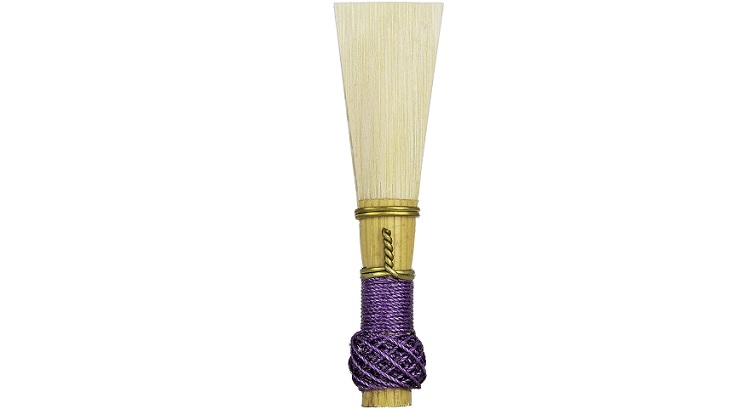
The Jones JR201AM bassoon reed has an even tone and intonation throughout the instrument range. Reed makers use diamond cutting equipment to get a precise finish and the right gouge.
They also use unique technology to help finish the reed tip to give it the best result. The blades are finished well and have asymmetrical design. Finally, a bassoon artist in residence play tests each reed to make sure it’s of good quality.
You can choose from different hardnesses, including medium-soft, medium, and medium-hard. That way, you can get the response that you need when playing the bassoon.
Pros
- good quality and quality control
- easy to play
- Hardness options
Cons
- Better for players with some experience
Jones JR201MS
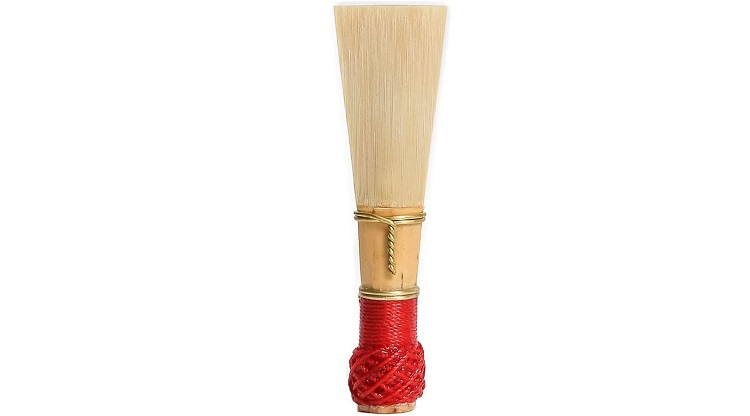
If you want something a little more affordable, try the Jones JR201MS. It has a similar design to the other Jones reed, but there are some crucial differences. The reed makers of choose cane with the right thickness and diameter to create a good reed. Most of the steps are then done by a machine to make the reed easier and more affordable.
In the end, someone assembles each reed by hand and adds the thread and a coat to protect the yarn. The company makes sure to test each reed, and they’ll adjust them so they’re easy to play.
Pros
- Available in different hardnesses
- good quality
- Suitable for beginners
Cons
- Can be hard to play on at first
Singin’ Dog Bassoon Reed
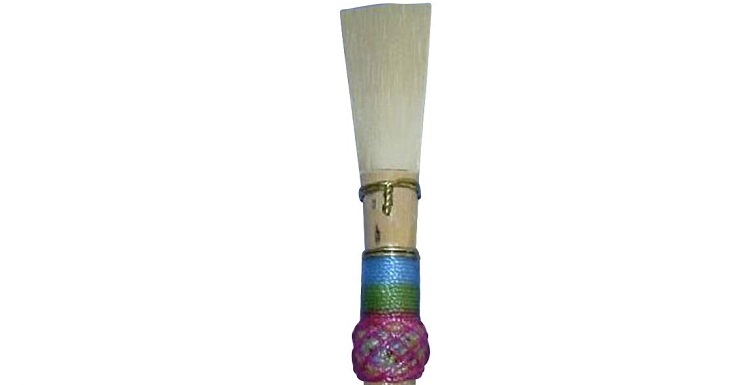
Another reed to consider is the Singin’ Dog Bassoon Reed. The reed is perfect for beginners and younger players since it’s easy to use to get a good sound. Someone hand finishes each bassoon reed, so you can know that it’s a high-quality product. It has a thread that helps keep the reed together, so you don’t have to worry about it not staying in good condition.
You can select from medium, medium soft, and medium-hard for the thickness. That way, you’ll be able to get the response and sound you want.
Pros
- easy to play
- great for students
- hand-finished
Cons
- the little expensive
Chartier CPB-MS
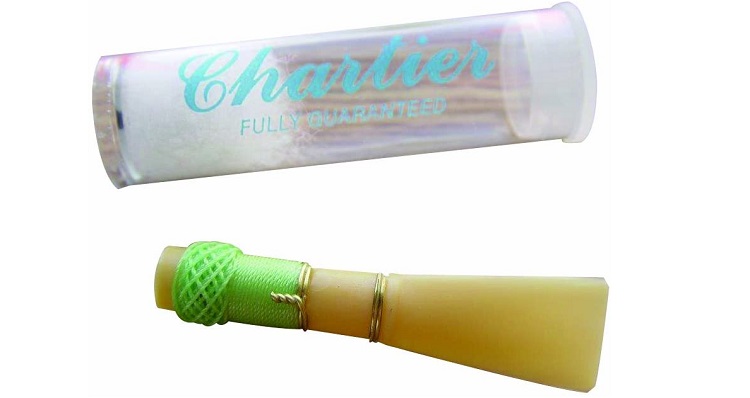
If you’re tired of going through reeds all of the time, the Chartier CPB-MS might be a good option. The plastic reed can last longer than one that uses cane, so you can get more life out of it. You can play the bassoon easily with this reed, and it has a medium-soft hardness. That means it can provide a sweet response for players of all levels.
It’s more expensive than some reeds, but it can cost about the same or less per use since it lasts longer. You can even clean the reed and share it with someone else if necessary.
Pros
- Durable
- good design
- easy to play
Cons
- Becomes unusable if it cracks
Selmer 707MS
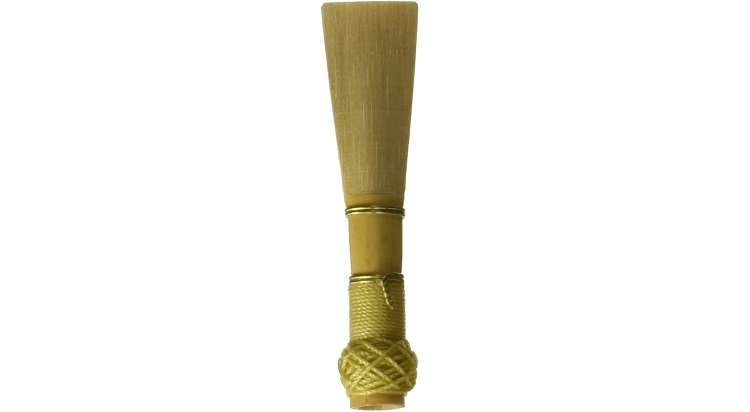
The Selmer 707MS is another cane reed that can work well for many bassoon players. It’s medium-soft, so it’s excellent for playing as a soloist, but you can also use it in a group. These reeds are also suitable for students and other players who don’t want to make their own reeds. They offer a fantastic response, and the sound and response are consistent.
You can buy more of these reeds as you advance, and you can get a good sound with them. An individual reed isn’t too expensive, but it’s also not the cheapest on the market.
Pros
- easy to play
- versatile
- not too expensive
Cons
- Not for advanced players
How to Make Bassoon Reeds
If you want to use the highest quality bassoon reeds possible, you can buy some. However, making your own bassoon reeds means you have more control over the end product.
You also don’t have to spend as much on each reed once you get some reed-making supplies. After you stock up on knives and other gear, you’ll only have to buy more cane.
If you can’t find the best reeds to buy, follow these steps to start making some.
Gather Your Supplies
First, you need to make sure you have some vital supplies to make and adjust your reeds. If possible, keep these things on a table or desk so that you have plenty of space. You’ll need:
- Cane
- reed knife
- holding mandrel
- Forming mandrel
- arrow plates
- nose pliers
- diamond files
- reed drying rack
- Thread or yarn
You can keep all of these supplies together to make the process easier. Or you can store them and bring them out each time you want to make more reeds.
Split the Cane
If you buy plain cane , you’ll need to split it into four sections that are the same size. Then, you will need to strip the bark at the center to prepare the cane.
Fortunately, you can bypass this step with prepared cane. That way, you just have to sculpt it into a reed. Using prepared cane is good for your first few times, but you don’t have to use plain cane at all.
Cut the Edges
Now, you get to cut the edges of the cane so that the cane looks like a boat. Be sure to cut the long edges of the cane and keep each side as symmetrical as possible.
If something is off, you can adjust it later. However, getting it close to even now will help you save time.
Fold the Cane
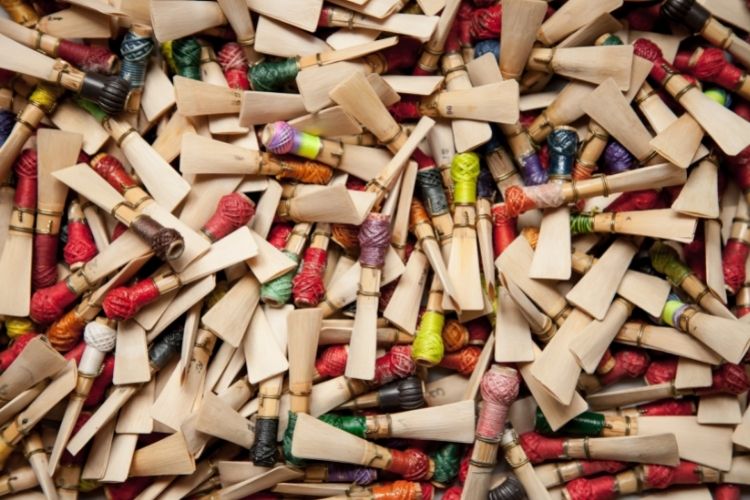
The next step to making some of the highest quality bassoon reeds is to fold the cane in the middle. Before you fold it, be sure to score the cane.
Once you fold it, you can take a knife and cut vertically to remove any leftover bark. That way, you won’t have to worry about cutting yourself on it when you play. Be very careful that you don’t ruin the reed.
Use the Mandrel
You should see the reed start to form, and you can use a mandrel to help hold the cane in place along the fold. Fasten the base of the reed to keep its shape.
At this step, you can use thread or yarn to wrap around the base of the reed to secure it. Add a top coat of something like clear nail polish so that the yarn doesn’t fray.
Test It
After you add the thread or yarn, you’ll need to let the reed dry and sit for about a day or so. Grab your bassoon and come back to the reed so you can test it out.
Make sure you get a sound in the low and high registers and that you like the tone quality. If there are any issues, you can use the reed knife to trim the edges and make other adjustments.
FAQs
Answer: When shopping for reeds, you may find that they are expensive, particularly when you need to buy multiple of them. Because they require a lot of time and materials to make, they have a high price point.
And not all reeds will be successful, so reed makers have to account for the lost time and materials. Bassoon reeds are also bigger than oboe reeds, so while they follow a similar manufacturing process, they cost more.
Answer: Unfortunately, you can’t just buy a few bassoon reeds and use them forever. An average bassoon reed will last you about two or three months, but it may last longer if you don’t play much.
Answer: Making bassoon reeds is perfect for advanced players who don’t like the reeds they can buy. You can control the shape and size, and you can save money in the long term.
As a beginner, though, making reeds isn’t necessary. Spend this time learning the basics and using reeds made by people with experience so that you can get the best sound possible.
Answer: You should always have at least two or three reeds that you can use. If you play the bassoon a lot, you may want to have four or five in your rotation.
When a reed starts to die, you will have another one to replace it. That way, you won’t have to stop playing until you can buy or make another reed.
Final Note on the Highest Quality Bassoon Reeds
The highest quality bassoon reeds make the instrument easy to play. Unfortunately, they can also be very expensive, so many serious players choose to make reeds from scratch. Jones reeds are some of the highest quality reeds on the market. But if you don’t like them, you should buy some reed-making supplies. Then, you’ll be able to use reeds that offer the best sound you want.

